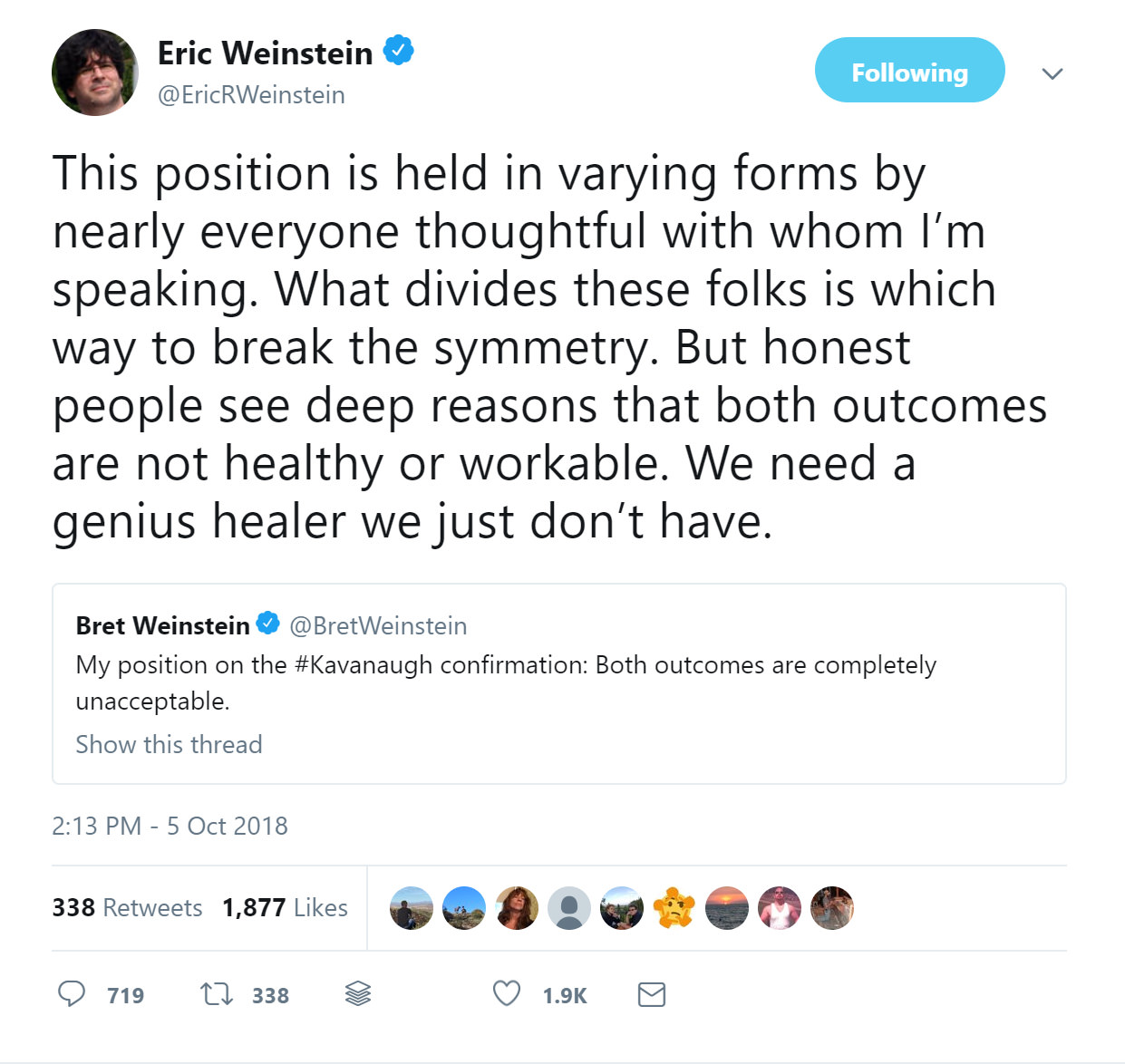
This week (October 5, 2018), I responded to a Twitter thread consisting of a conversation between Bret Weinstein, the American biologist and evolutionary theorist who was once (before the controversy) a professor at Evergreen College, and his brother Eric Weinstein, Managing Director at Thiel Capital, and the man who coined the term Intellectual Dark Web:
Bret stated his belief that there was no good way out of the present Kavanaugh conundrum: “both outcomes are completely unacceptable.” I took that to mean that failing to confirm Kavanaugh would (1) dangerously embolden those who (1) believe that we should dispense with the presumption of innocence for those accused of sexual misconduct (“believe all survivors”) and (2) provide a victory to those inclined to weaponize such accusations for personal or political gain; while confirming him would place someone on the Supreme Court whose every judgment would be employed by the grievance industry for decades into the future as a more evidence for the utter corruption of the white male patriarchy and contribute in that manner to continual civil unrest.
Eric then stated, in response, “we need a genius healer we just don’t have.”
I asked myself a question, after reading these posts: “Is there an alternative to confirming or not confirming Kavanaugh?” When a choice appears starkly binary, a third path appears impossible, by definition — but might possibly still be worth seeking. I tried to place myself in Kavanaugh’s position, while generating a potential answer (and think that I can do so with some justification, having been publicly identified as reprehensible by many people—prominent journalists, activists, and academics among them).
I thought, “He can’t withdraw, prior to the nomination, because his reputation has been savaged so badly that withdrawal would not only mean loss of the Supreme Court nomination, but demolition of his entire career and future life.” So the only way for Kavanaugh was forward, through the FBI investigation, on to the nomination hearing, and the hope that he would be… what? Cleared? Not cleared, because it is too late for that, even given the favorable or at least not damning FBI report. A large percentage of the American public does not believe that he is an appropriate choice for the highest bench position in the land (51%, according to NY Mag: https://nym.ag/2RwLUGt, citing a CNN poll). I’m not claiming, necessarily, that CNN’s poll is reliable. It doesn’t matter. What matters is that there is very widespread opposition to his candidacy, much of it generated not by people’s belief in his innocence or lack therefore but by their objection to the manner in which both parties handled the nomination process.
It’s not a good thing when there is general discomfort with the manner in which something as important as the naming of a new Chief Justice is undertaken. It doesn’t bode well for the stability and peace of the state (and perhaps–perhaps–there is nothing more important to preserve than that).
So I thought, “What might I do in such a position?” Withdrawing, prior to a full investigation, did not constitute an acceptable option. But it’s not clear that accepting the position, given the scale of opposition to my candidacy (“my,” in my simulation of his situation). So what if the FBI cleared me, I received the nomination, but then decided that it might be best for medium- to long-term peace and the good of the country if someone who shared my views but who had not been contaminated, rightly or wrongly, by the horrors of the nomination process in question be put forward as a candidate in my stead? Objections to that might include:
- Perhaps the Democrat opposition would mount a similar campaign against my putative successor. But that would provide virtually unassailable evidence for the purely manipulative and political motivation of the accusers, forcing them to duplicate their strategy a second time. That would help reveal the machinations for what they were, in a manner that would be virtually undeniable.
- Perhaps time is of the essence, and there would be no way to place another candidate of conservative leaning on the bench before the November elections. As they say, however: “act in haste, repent in leisure.” It might be acceptable to wait a month and test the democratic waters: if the Republicans do well in November, then their moves to nominate the candidate of their choice have been fully and evidently vetted by the electorate. That’s not a bad medium-to-long-term strategy.
- Perhaps it is necessary, as an act of patriotism, to sacrifice personal ambition for the broader welfare of the country.
- Perhaps that would also enable “me” (Kavanaugh) to regain the moral upper hand, in some permanent manner: with my name cleared, enabled in at least some manner to go on with my life, I could clear the way for the next, hopefully less contentious candidate.
So those were my ideas. And I responded to the Weinsteins in this manner:
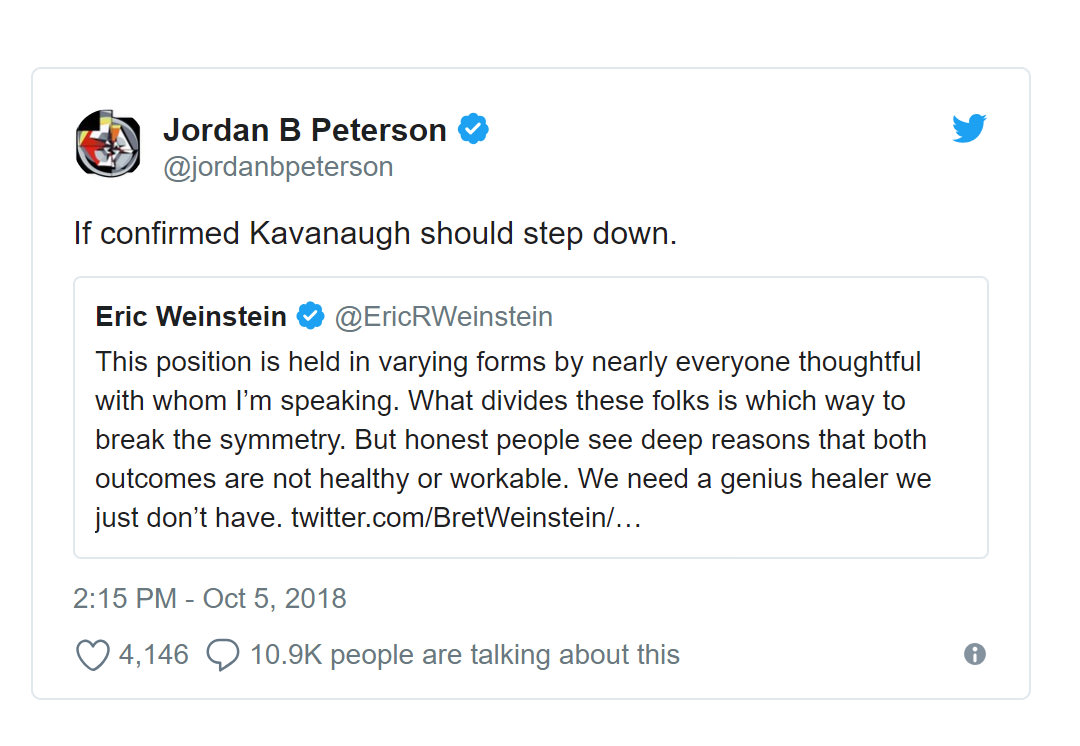
This made many people unhappy. Some of them—viewers and listeners positively inclined toward me, by their own account—regarded my actions as a betrayal. And, in response to that, here’s a mea culpa (in keeping with my conviction that it is best to look to your own misbehavior if things go sideways): It was an error for me to use Twitter to express such thoughts, particularly in the condensed form that Twitter requires. I was laboring yet again under the naïve misapprehension (and should have known better at this stage in the media war) that I could offer an idea—not a certainty—for consideration on that platform. I should have known better not least because I had already discussed the dangers of Twitter, for example, with my son, who insisted over many months that if I engage in contentious issues online that I should do so with a longer blog post, and link to that with Twitter. I should have known better because Twitter appears primarily to be a forum where errors are magnified and outrage and vitriol almost certain to emerge whenever uncertainty about motive manifests itself.
(I honestly don’t know what to do with Twitter. It’s a very dangerous platform, and may well be doing more harm than good. But I have something approaching a million followers. Do I owe them a certain allegiance? Should I just abandon my account, or should I try to use it properly, whatever that means? I think it would be safer for me to leave Twitter and it would almost certainly better for my mental health and ease of mind and conscience. These new technologies are by no means simple and they are unforgiving. I’m not complaining, by the way: I have benefited greatly from their existence. Furthermore, he who lives by the sword…. I conducted a straw poll during the Q and A after my last lecture, in Colorado Springs, asking my audience to indicate by clapping if I should continue with Twitter–mild applause–or cease using it–much louder applause. And these were definitely people who were positively predisposed to me. Should I take their advice? And if I don’t, is it because I feel allegiance to my Twitter followers or am afraid to be out of the loop?)
Here is a sampling of the Twitter responses:
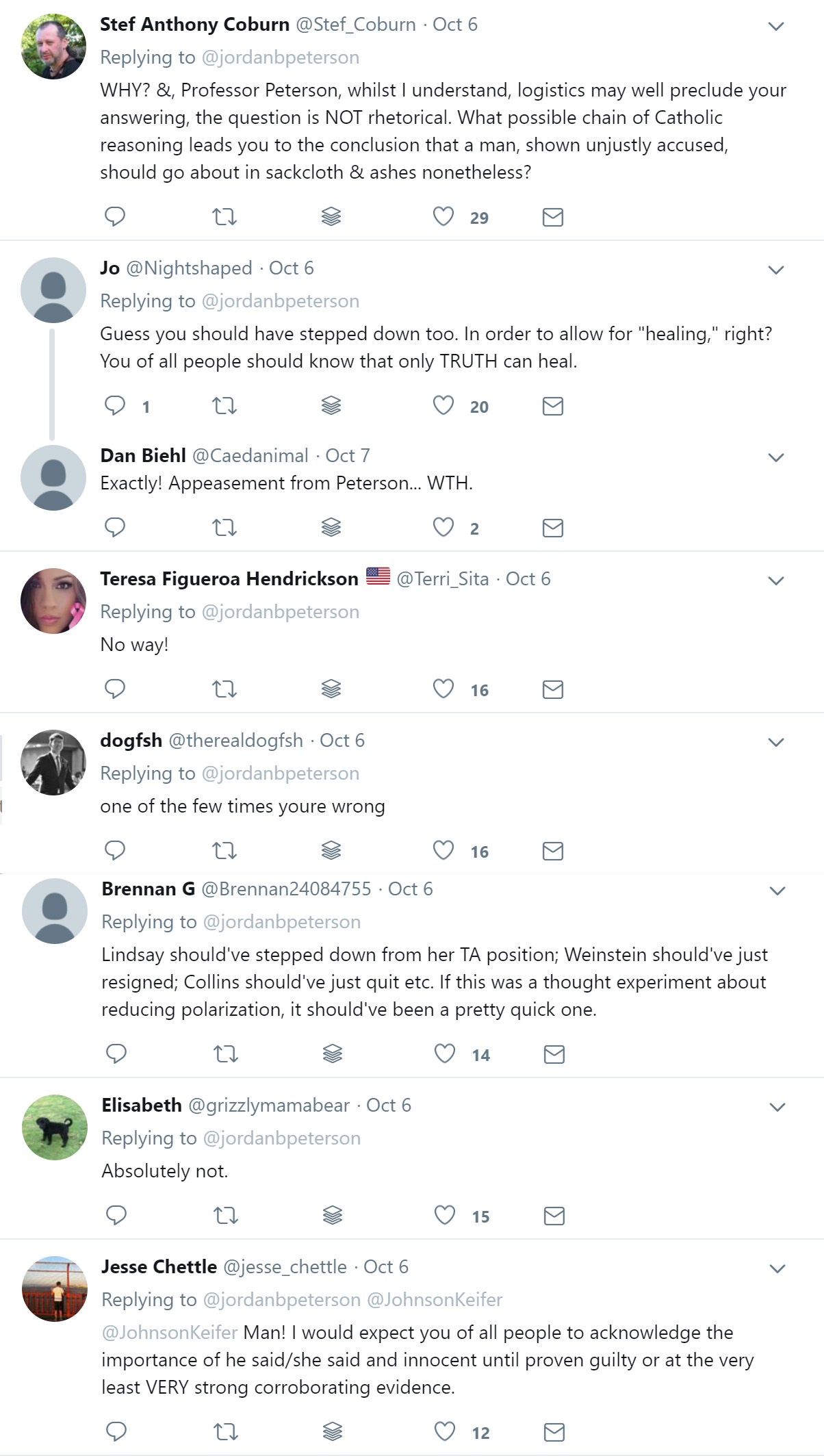
A flurry of responses also emerged on Youtube, from people such as Gad Saad, Owen Benjamin, Karen Straughan, and Scott Adams, all offering their opinions (and reasonably so). A variety of journalists also entered the fray (the people at Breitbart, for example, and The Blaze. Finally, many people who were positively inclined readers, viewers or listeners prior to this tweet took the opportunity to object to what I had said on YouTube channels where other video content that featured me had been posted. It takes very much to build a reputation and very little to destroy it. And if it’s error that destroys it, rather than falsehood, then no one is immune.
And so I attempted to clarify what I meant on Twitter:
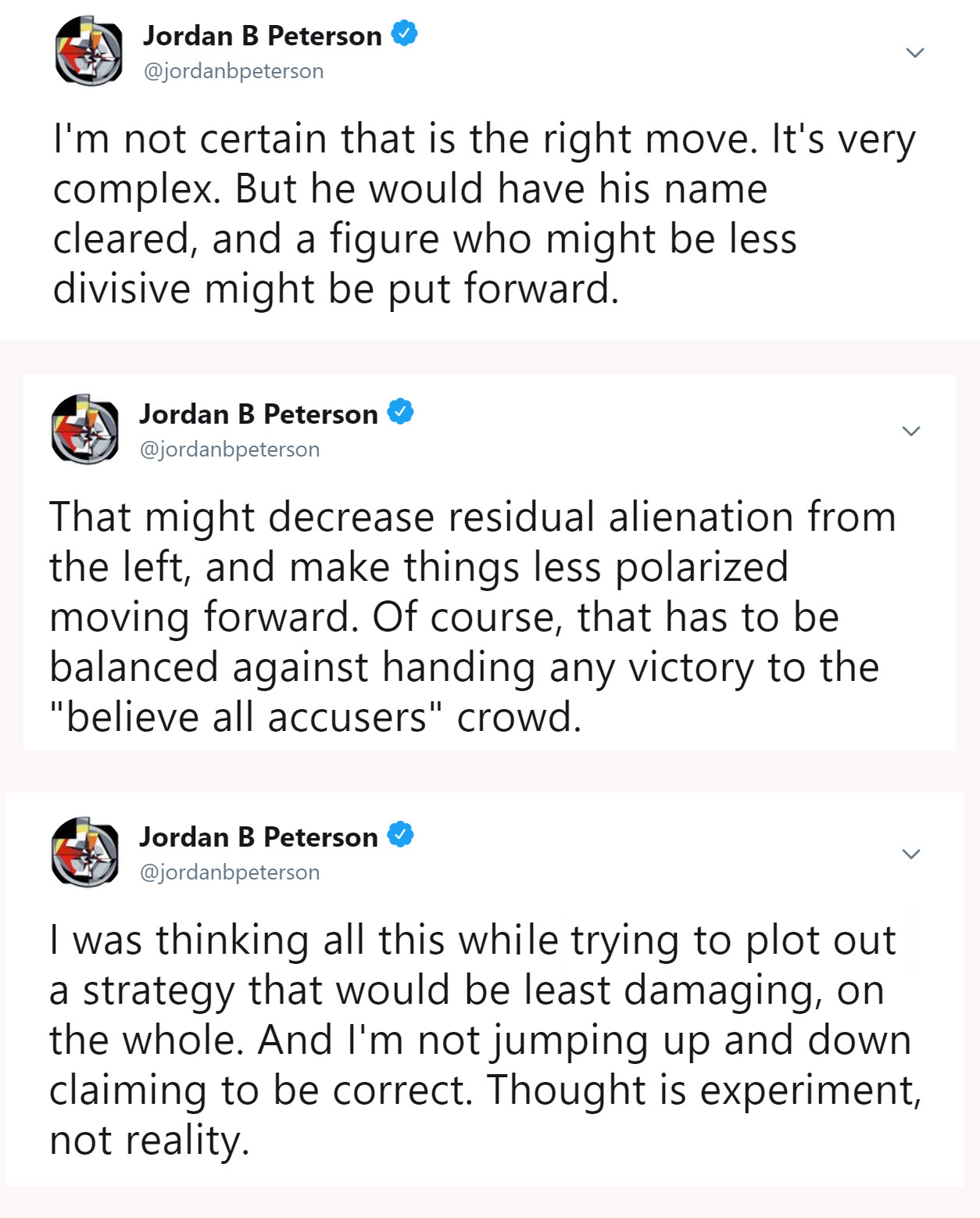
I linked to this news report from NBC news, detailing the emergent “progressive Democrat” plan to impeach Kavanaugh, if provided with sufficient electoral power, and then closed that Twitter string with this:
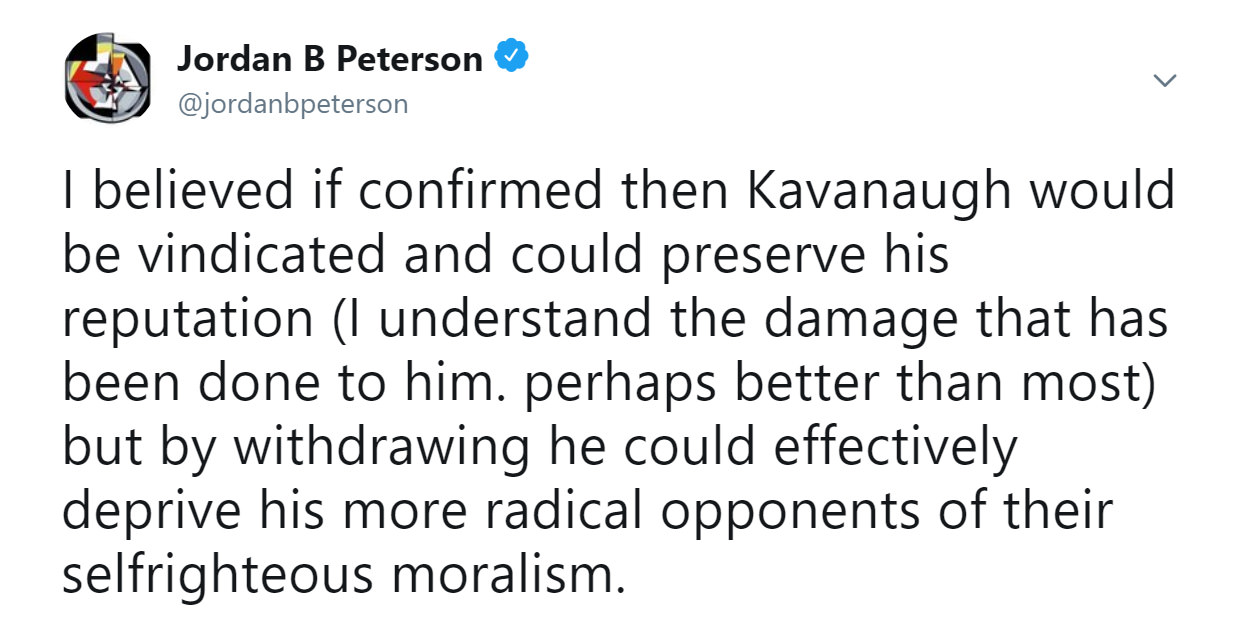
Yesterday, I posted this:
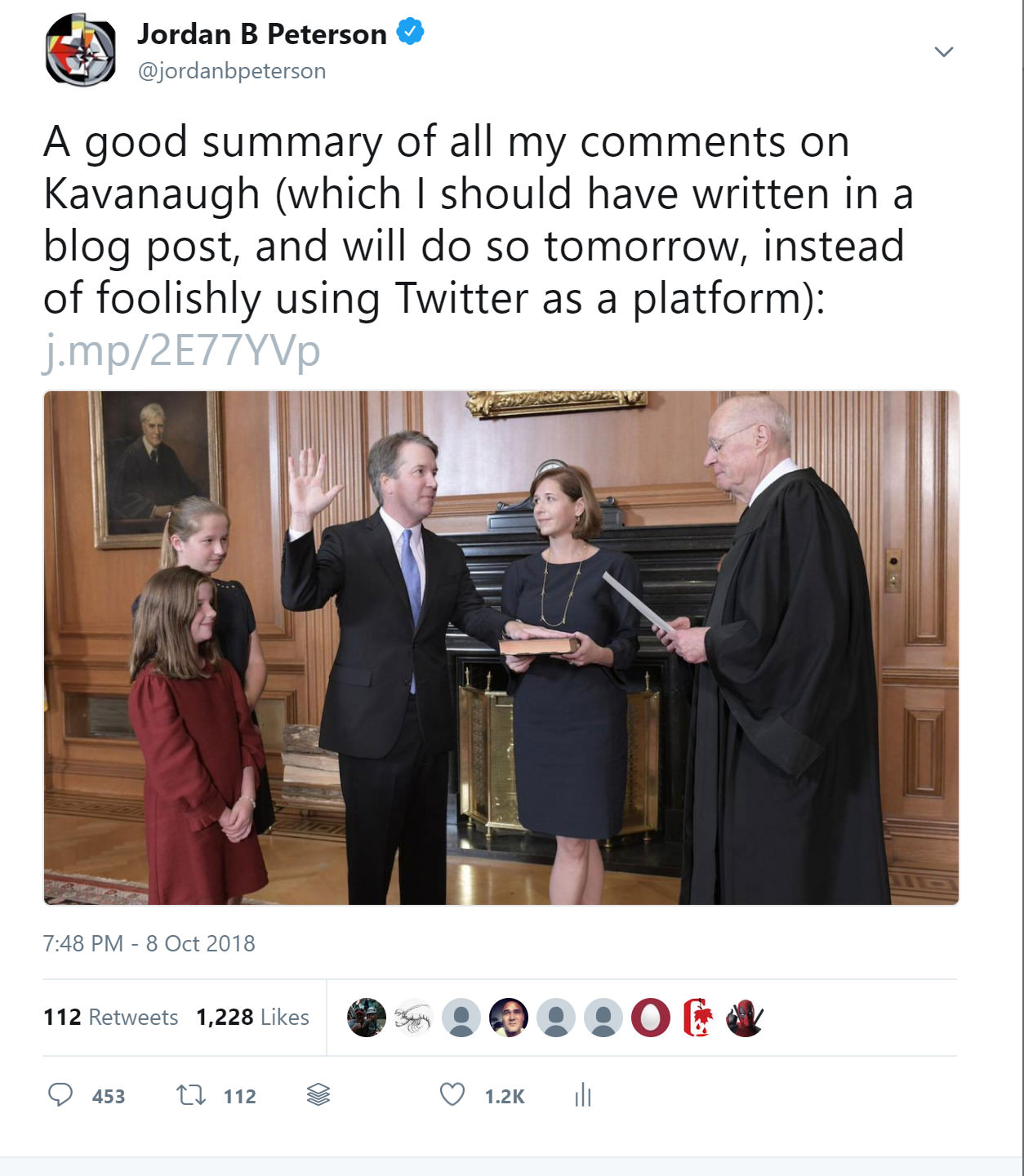
And today, I wrote the present blog post as I indicated I would.
Having said all that, I would like also like to point out that I am not claiming that the opinion I put forward—the alternative I offered—is or was correct. I am accustomed, as a research scientist, to generating hypotheses: “this is what everyone thinks the problem is, but maybe it’s this, or this, or this, or this” or “here is a potential solution, but here is another, and another, and another” and “let’s discuss these various possibilities and test them.” It is very easy for me to forget that in these heated and impulsive times thoughts and simulations are immediately regarded as canonical opinions, indelibly defining personality and character now and forever.
In the spirit of noting that I am not necessarily correct, here is a list of some reasonable objections to my suggestion (some of which I had considered prior to responding, some of which were brought to my attention afterward): Withdrawal on the part of Kavanaugh would be
read as an admission of guilt on his part;
- embolden those who would use reputation destruction as a political maneuver;
- weaken the general and vitally important idea of the presumption of innocence;
- indicate weakness on the part of the Republicans at a key moment prior to the November elections;
- mean that an innocent man has been successfully pilloried by a mob;
- validate the use of allegations of past behavior well past any reasonable expiry date as a weapon;
- destroy the Republican opportunity to choose a Supreme Court Justice;
- hand the Democrats an unearned victory; embitter a large percentage of the conservative base, who would regard the withdrawal as a betrayal; and, last and perhaps least,
- violate my own adage “don’t apologize if you haven’t done anything wrong.” This is by no means a complete list of objections, but might be considered reasonable representative and somewhat in the steel man spirit.
These are all valid points, and one or more of them (or even all of them) may well constitute the proper basis for forward movement on the part of Kavanaugh and the Republicans. Time will tell.
I would also say, however, that Kavanaugh compromised himself somewhat during this process. No doubt this claim will also attract its share of criticism. But I don’t exactly buy his explanations of his high school slang, nor his refusal to admit drinking to the point of being unable to remember. It’s very common for young men to joke in a denigrating manner about women, often to mask their fear (and very rarely as a consequence of genuine anger) and it doesn’t require that much alcohol to produce failure of memory (certainly no more than the typical wild-partying teenager might imbibe, particular before the development of tolerance for drink and familiarity with the effects of over-indulgence). I also think that he made a strategic mistake insisting upon the partisan nature of the nomination process (even though what he said was at least in part accurate). That wasn’t timed well. Kavanaugh made mistakes. Now, no one is perfect, and if perfection is the prerequisite for public office then we are going to run damn short of politicians and administrators. But becoming a Supreme Court Justice is not just another opportunity, and it isn’t obvious to me that nominees get to make such mistakes under such intense circumstances without doing permanent damage to their credibility (and, much worse, to the credibility of the court).
In closing, I have this to say: I am very glad that I personally did not have to come to the decision that was formulated by the complex competitive interactions of the Senate. I am as well very relieved that there exists a viable mechanism to make such decisions.The entire nomination process was a murky mess, to say the least, at every level of analysis: legal, philosophical, political and personal. But it was sorted out in a legal and fundamentally conventional manner. The Senate voted, as was their right and responsibility. For better or worse, they are all elected officials and, therefore, valid representatives of the fractured people. If the majority of citizens affected by this decision feel that they have been ill-served, then they can express their displeasure as soon as November, and again in 2020. The necessary corrections can then be made, difficult as they may be, if that remains a priority.
In the absence of a better way of making decisions (and I don’t see one) then the democratic method will do. It might be reasonable for all of us to take a step back and evince some faith that it has and will continue to function as well as we could hope.
Regardless of our faulty, egocentric, impulsive, ill-informed individual opinions on the matter at hand.